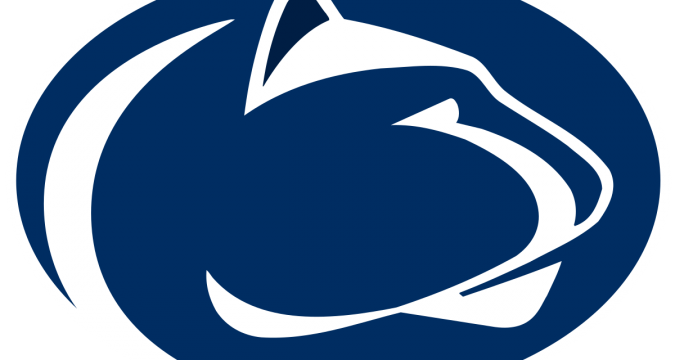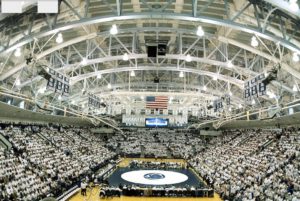
Courtesy of John Harrison
As a collegiate wrestler, Bill Koll dominated his weight classes (145 and 147.5 pounds). He was an NCAA National Champion in 1946, 1947 and 1948 and was also named as the NCAA Tournament Outstanding Wrestler in 1947 and 1948. His final collegiate record was 72-0. He was also named as the Outstanding Wrestler in the 1948 Olympic Freestyle trials and went on to place in the Olympic games. Bill, who served in World War II and participated in D-Day and the Battle of the Bulge (where he earned a Bronze Star), graduated from the Iowa State Teachers College (UNI) in 1948 and then went on to earn a Master’s Degree from Northwestern University. He soon returned to UNI as the head coach and in his first year led his team to a fourth place NCAA finish. Bill subsequently finished his Doctoral Degree and coached and taught at UNI until 1964 when he accepted the head coaching position at Penn State University. He was the head coach at PSU for 14 years during which time he led the Lions to six top 10 NCAA finishes and coached three individual national champions. He also served as a professor of Physical Education. His final Penn State coaching record was 127-22-7. He has been named to the National Wrestling Hall of Fame, the Helms Athletic Foundation Wrestling Hall of Fame, the Pennsylvania Wrestling Hall of Fame and the Iowa Wrestling Hall of Fame.
As a coach Bill was, and still is, one of the finest technicians and knowledgable persons in the sport of wrestling that there has ever been. I never had the pleasure of watching him wrestle other than in our wrestling room when he-even in his mid to late forties-could still beat the heck out of anyone in the room. Many claim that he was the best collegiate wrestler ever to set foot on a mat. He was only taken down once in his whole collegiate career and he never had a close collegiate match. He just totally dominated people-he took pride in not letting people score on him. As far as being a technician and a coach he was just tremendous. He believed that the motivation and the discipline had to come from the individual. He was not a big pep talker, but he got everybody to develop confidence, pride and respect and to work hard. I wrestled for him for four years and coached with him for six and at the end of ten years I was still learning from the man. He was just so advanced in his knowlege about, and ability to teach set ups, reaction to stimulus from opponents, chain wrestling and using power to explode on your opponent. He also had us doing isotonics before most strength coaches even knew about it. He was just a tremendous person-he really became like my second father-a father away from home. He was also a prankster; he liked humor and he liked to play jokes on people and he didn’t mind if jokes were played on him, but when it came to wrestling he was all business-very intense.
-former Penn State wrestler and head coach, Rich Lorenzo
Bill, what have you been doing since you retired as head coach at Penn State?
Within limitation, anything I want to do, and little that I don’t want to do. My main interests: gardening, napping and eating.
You always knew where you stood with Coach Koll, though sometimes you wish you didn’t ! That straight forwardness of Coach Koll was what attracted me to Penn State University as a high school student. Through the years as a member of the team and later as an assistant coach, and now as an alumnus my respect for Coach has continued to grow.
-former Penn State wrestler, Andy Matter
What are your best memories from the years you spent as a collegiate wrestler?
Winning three NCAA championships and two OW awards.
Bill, what are your best memories from the years you spent as the head coach at PSU?
Watching boys develop into really good wrestlers and later seeing these men succeed in their fields.
Bill was an outstanding coach and he made a tremendous impact in my life. He taught me a lot about goal setting, discipline and focus, all of which I have been able to use in the business world.
-former Penn State wrestler, Ira Lubert
How has collegiate wrestling changed since you retired as head coach?
Generally it is slower and wrestlers depend more on strength moves.
In high school, I was fortunate to be recruited, to some degree, by a number of “good wrestling” schools and their “famous coaches,” including both Okies and both Iowas. I chose PSU simply because of Bill Koll. Granted, I “knew him” best, in that I had the opportunity to work with him in several summer wrestling camps, but he also exhibited some particular traits in a college coach I found refreshing. He was intense, but mature enough, he didn’t seem to feel the need to compete with you for attention, control, or dominance, and it obviously wasn’t his entire world. Note that he had a rather large family, which he obviously enjoyed. He was truly “tough,” which I (and I think he would) regard as a prerequisite to becoming a truly accomplished wrestler. Lots of people think they’re tough, but if they have to think about it they usually aren’t. Further, (and possibly most important to me) he understood the game. He enjoyed understanding and doing those things (read: “moves”) that made wrestling interesting and fun. He liked to “slick ’em”!! With intensity, toughness, and an understanding of the game applied, the score/outcome of any endeavor usually takes care of itself.
-former Penn State wrestler, Clyde Frantz
What advice to you have for collegiate wrestlers?
Go to class! Keep your education as your first priority. On the mat: keep your elbows in, keep your head up and don’t reach.
Thanks Bill!

